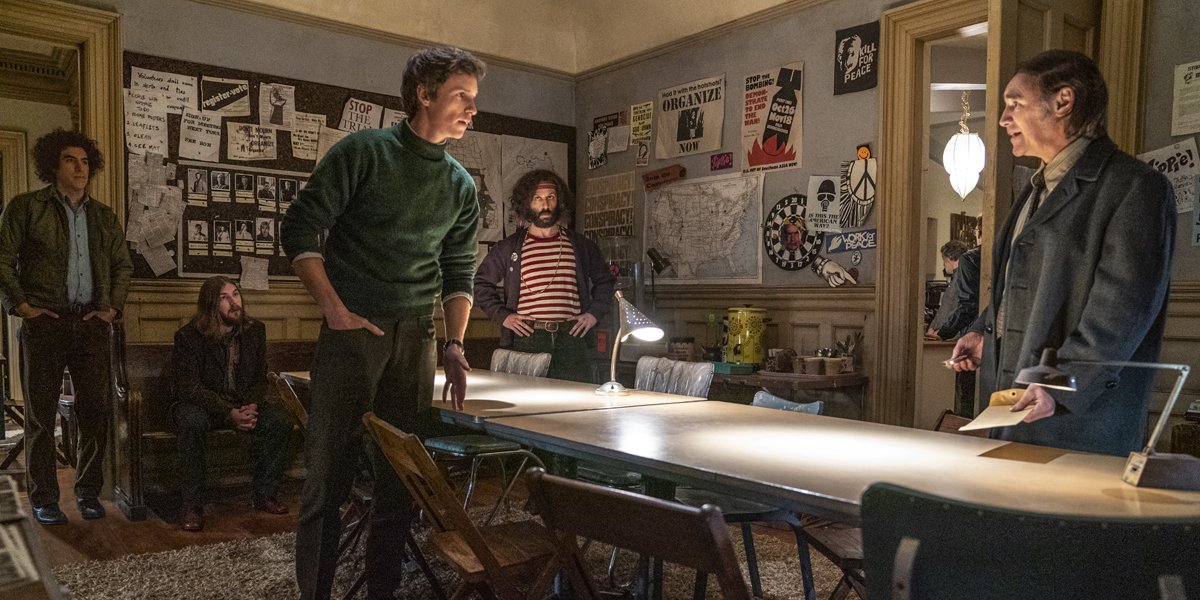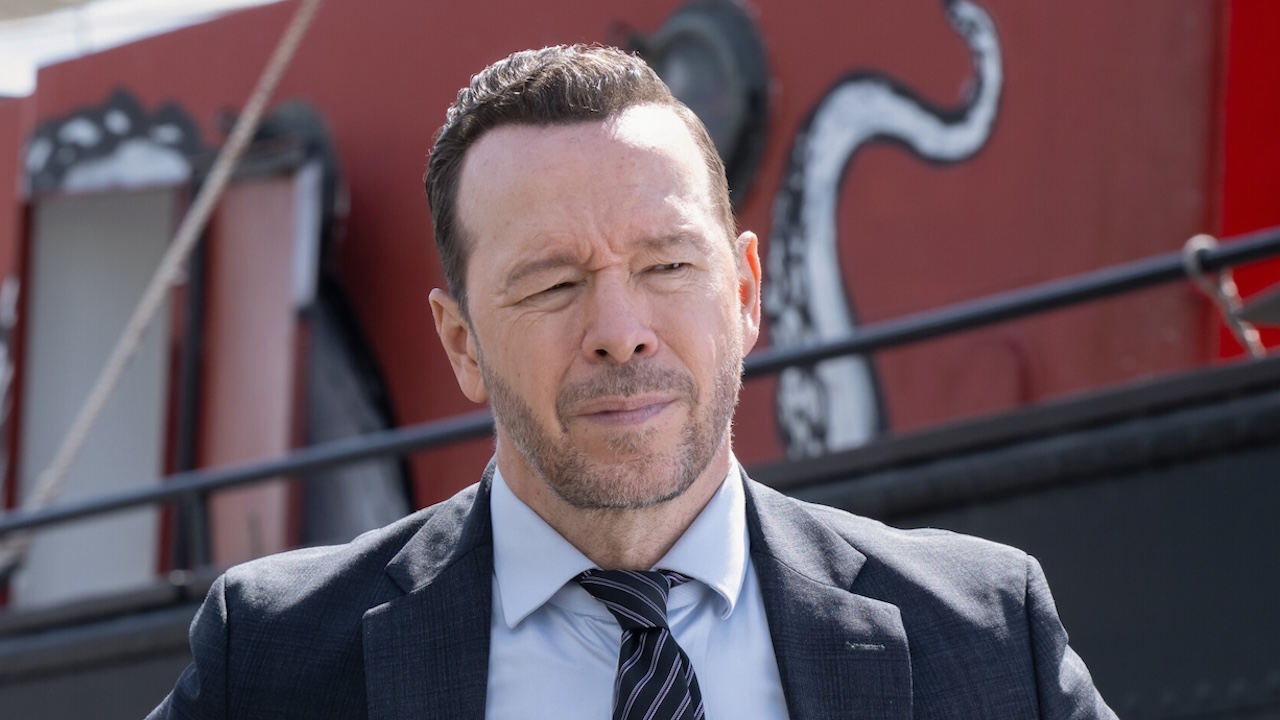A top-tier Aaron Sorkin courtroom drama. Really, what else do I have to write in this review beyond that to convince you to check out The Trial of the Chicago 7? Sure, I can bloviate about Sorkin’s razor-sharp dialogue, his inspired casting (Sacha Baron Cohen as Flower Power provocateur Abbie Hoffman is a masterful stroke), and his uncanny ability to connect the dots from historical occurrences to our jarring contemporary headlines.
But the main reason to watch The Trial of the Chicago 7 is because it returns Aaron Sorkin to the political-legal realm where he has soared in exercises such as The West Wing, The American President, Charlie Wilson’s War and his masterpiece, A Few Good Men. By recounting the lopsided prosecution of the Chicago 7 (plus Black Panther president Bobby Seale), Sorkin comments on our current divisions – political, social and racial. It’s slick, well-assembled Hollywood entertainment that should entertain as it educates, and hopefully infuriates, its audiences.
Aaron Sorkin’s Trial of the Chicago 7 script unfolds like a melodic symphony of words and ideas.
Again, hardly a groundbreaking statement. Oscar winner Aaron Sorkin arguably is our strongest working screenwriter, no matter the genre he’s choosing to tackle. And he’s masterful at connecting the dots in an historical narrative that retells an important story – the invention of Facebook, the rise of Steve Jobs – from opposing points of view.
In 1968, leaders from various social and political parties converged on Chicago to make their voices and views heard during the run up to the Democratic National Convention. Following a series of violent confrontations that pit area police officers against protestors, eight men were arrested and charged with inciting riots, though the opposition they faced came more from a government establishment being bombarded on all sides by anti-Vietnam sentiment.
Sorkin finds fertile ground to till in explaining how the Chicago Eight ended up on trial. Hippie anarchists Abbie Hoffman (Sacha Baron Cohen) and Jerry Rubin (Jeremy Strong) got off on pushing the buttons of the D.C. elite. Tom Hayden (Eddie Redmayne) and Rennie Davis (Alex Sharp) subscribed to the ideals of the anti-war movement, while also believing Hoffman’s laissez-faire attitude did more harm than good for their cause. And Bobby Seale (Yahya Abdul-Mateen II) resents the fact that he’s only part of the trial so that the controversial Black Panthers can be prosecuted, which leads to unexpected fireworks.
You might need a scorecard to keep everyone straight until The Trial of the Chicago 7 settles into its groove, because Sorkin doesn’t pause to fill in gaps with arbitrary dialogue setting scenes. The kinetic energy created by his intelligent script carries you along until you grasp the big picture, while a repeat viewing allows you to burrow in and find the nuance that’s present for scholars of history and politics.
Eddie Redmayne, Sacha Baron Cohen and Aaron Sorkin’s full cast play their roles to perfection.
Sorkin’s scripts hardly struggle to lure A-list talent. Brad Pitt (Moneyball), Michael Fassbender (Steve Jobs) and the powerhouse duo of Tom Cruise and Jack Nicholson (A Few Good Men) all have done some of their best work reading Sorkin’s lines. The Trial cast isn’t loaded with marquee names, but the actors chosen fit beautifully into the script’s needs, even if they’re only needed for a brief cameo or significant transition sequence.
Your Daily Blend of Entertainment News
The Trial of the Chicago 7 showcases the entire ensemble. Cohen and Strong get to play fast and loose, in comparison to Redmayne’s conservative and book-smart approach, but every portrayal is important to the larger narrative. Bobby Seale’s plight comes off as the most dangerous, as he stares down Judge Julius Hoffman (Frank Langella) with no legal representation. And both sides of the judicial argument are expertly represented by Joseph Gordon-Levitt and Mark Rylance, personifying the parties they’re asked to represent with distinct visual cues and conclusions about the respect the court system deserves.
There’s one slight nitpick on an otherwise ideal The Trial of the Chicago 7.
And that’s the fact that Sorkin chose to direct his brilliant screenplay himself. He’s definitely improving as a filmmaker, moving to the substantially better Trial after the uneven Molly’s Game. And I eagerly anticipate where Sorkin might be as a director in, say, a decade. His work here is efficient. The package is glossy and polished, though the sheen doesn’t distract from the underlying message.
But just as Sorkin’s script attract top acting talent, they also positively hum when he allows genius filmmakers to apply their detached filters to the screenwriter’s material. Think of David Fincher layering an arrogant chill on The Social Network, or Danny Boyle choosing to film the different eras of Steve Jobs’ ascension in varying aspect ratios and competing film stocks. Would a different director have applied auteuristic flair to Sorkin’s masterful Chicago 7 script? Undoubtedly. So while I understand that Sorkin can only improve as a director by directing, I lament ever so briefly the true level of wizardry this already fantastic film might have achieved with that nudge from a generational talent.
Still, not enough of a knock to prevent The Trial of the Chicago 7 from getting a perfect grade from me. It’s one of this year’s very best films.

Sean O’Connell is a journalist and CinemaBlend’s Managing Editor. Having been with the site since 2011, Sean interviewed myriad directors, actors and producers, and created ReelBlend, which he proudly cohosts with Jake Hamilton and Kevin McCarthy. And he's the author of RELEASE THE SNYDER CUT, the Spider-Man history book WITH GREAT POWER, and an upcoming book about Bruce Willis.

